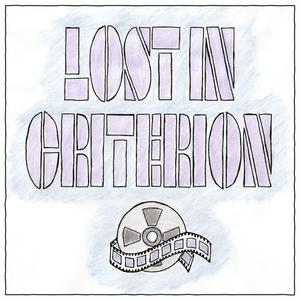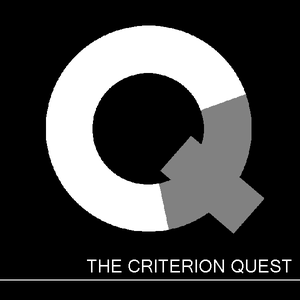
Lost in Criterion
Lost in Criterion
Two guys whose favorite movie is Hudson Hawk explore the Criterion Collection.
- 1 hour 57 minutesHoliday Special 2024: Powwow Highway (1989)
Jonathan Wacks' Powwow Highway (1989) takes a lot of trappings of a holiday road movie, but leaves them behind when needed as we explore the characters and relationship of two Cheyenne men struggling in to hold onto tradition in a world controlled by colonizers. This may be the first holiday film we've covered where the only person who says "Merry Christmas" is the villain. Christmas in Powwow Highway exists as a colonizers' holiday, but perhaps one held in tension as well.
Our dear friend Stephen G. joins us for as we celebrate another year in the books!
27 December 2024, 6:45 pm - 1 hour 50 minutesSpine 627: The Game
There are two David Fincher movies in the Criterion Collection, and The Game (1997) is the better one by a long shot, solely for not featuring the monstrous simulacrums of the human form that exist throughout The Curious Case of Benjamin Button (2008. Spine 476). The Game is mostly an interesting thriller that doesn't do enough with its San Francisco setting, but then in the last few minutes it jumps of a building and utterly fails to stick the landing.
20 December 2024, 8:09 pm - 1 hour 28 minutesSpine 626: Les Visiteurs du Soir
Marcel Carné made Les Visiteurs du Soir (1942) during Nazi occupation of France for a Nazi-owned production company, and while one could argue that this is collaboration and one could also argue that Carné used his position to help Jewish artists keep working, that fact that this is a Nazi-produced film is somehow not the most egregious part of the production. We spend a lot of time on what the most egregious part actually was in this week's episode, actually. Carné was clearly a man in conflict during production, but it's still mostly a delightful film and another data point for my list of cinematic Satans.
13 December 2024, 4:51 pm - 1 hour 43 minutesSpine 625: Eating Raoul
Paul Bartel directs this black comedy that's "not Lubitsch—but it’s not quite John Waters either", according to Criterion essayist David Ehrenstein. Eating Raoul (1982), is a story of America, of the normally hidden and unpunished violence of wealth accumulation. Or it's a story of America, of two prudish weirdos punishing the people they don't like. Or it's a story of America. the dream of revenge against the managerial class.
Or it's none of these things completely, as we get into a discussion this week about just how strong the metaphor in Eating Raoul is. But hey, it's still a pretty fun movie.
6 December 2024, 7:15 pm - 1 hour 57 minutesSpine 624: Quadrophenia
In 1975, the enigmatic Ken Russell adapted and directed The Who's concept album/rock opera Tommy into a memorable film. The Who, apparently, really enjoyed making movies and decided to follow it up four years later with an adaptation of Quadrophenia (1979), but this time hiring Franc Roddam who would go on to create MasterChef and is noticeably not Ken Russell. Quadrophenia is a throwback to kitchen sink dramas, angry young men disillusioned with a society they will be joining within a few months, but mostly just fighting each other and being sexist and racist while their at it. For a film about some of the most stylish subcultures of 20th century Britain, the film itself lacks style and flair, but maybe we just wanted Ken Russell back. It's a bit like Stephen King movies after The Shining.
29 November 2024, 7:59 pm - 1 hour 49 minutesSpine 623: Lonesome
We get three early films from Paul Fejos all under the banner of his 1928 part-talkie Lonesome. Also on the Criterion release is the much more interesting to us Broadway (1929) and the much less interesting to us The Last Performance (1929). Each film is inventive and interesting in its own right, but Broadway just kept getting bigger, facilitated by Fejos and his team inventing a camera crane, and then needing to build a sound stage that could accommodate their camera crane, and then needing to make a movie to justify it all.
The additional features on the Criterion release also give us plenty to talk about with biographical information on Fejos' later-career shift to anthropology and ethnography, a topic we are always willing to jump in on, though Criterion doesn't provide any examples of this aspect of his work.
22 November 2024, 4:50 pm - 1 hour 47 minutesSpine 622: Weekend (2011)
Andrew Haigh's Weekend (2011) is an exquisite character study of a Friday-Sunday fling between two pretty opposite young men, in a precarious time where homophobia is constantly bubbling in the background. It's also just one of the cutest love stories we've experienced in the Criterion Collection. Just an absolute delight of a movie.
15 November 2024, 8:41 pm - 1 hour 29 minutesSpine 621: Rosetta
Last week Criterion introduced us to the work of Luc and Jean-Pierre Dardenne with a phenomenal film, but this week they follow it up with something somehow even better. From it's frenetic first few minutes, Rosetta (1999) is the story of a a young woman that believes she can find freedom, or at least dignity, or at least normalcy in work. But she, and we, live in a society that doesn't actually care about freedom or dignity or even, really, normalcy, at least not for the lower rungs of the economic ladder Rosetta lives in. It's sort of an answer to and modernization of Bresson's Mouchette (1967), but the Dardenne are much more interested in social realism than Bresson ever was.
Like last week's film, and many social realist films we've seen, Rosetta doesn't end on a hopeful not, but perhaps on the hope for hope and the promise of freedom and dignity that comes from community and care. We need that now.
8 November 2024, 4:41 pm - 1 hour 28 minutesSpine 620: La promesse
Our introduction to the films of Belgian brothers Luc and Jean-Pierre Dardenne, La promesse (1996) is, like last week's Le Havre, a story of African migrants in Europe. But where Aki Kaurismäki took a more magical approach, the Dardenne's hew much closer to the intense realism of, say, Ken Loach. The brothers' history in documentary perhaps make it even more intense than what Loach we've seen. It's a story of rejecting what you've been told is the order the world must work in, and finding the community and care that your heart cries out for. A better world may be illegal, but it remains possible.
1 November 2024, 4:32 pm - 1 hour 17 minutesSpine 619: Le Havre
Aki Kaurismäki's Le Havre (2011) is a hard movie to categorize. It's the dramatic tale of solidarity and sanctuary, of a community setting aside petty differences to protect a vulnerable migrant. But it's not social realism; It's more magical than that. Some critics call it fairy tale-esque, Pat calls it a children's story, none of them to dismiss it. The moral here is one of a kids' book, but it's a child's morality that needs to lead us: Community brings life.
And that's not a miracle; it's a fact.
29 October 2024, 12:05 pm - 1 hour 21 minutesSpine 618: Gray's Anatomy
Steven Soderbergh's film adaptation of Spalding Gray's monologue about avoiding an eye surgery, Gray's Anatomy (1996) girds Gray's George Carlin-esque delivery in some dynamic visuals and inter-cuts them with stark black and white testimonials of people recounting there own terrible eye injuries. Perhaps not for the squeamish, but it's still an engaging story.
I don't comment on it in the episode, but Gray gives a shout out to Columbus, Ohio, hotdog institution Phillips Coney Island, which closed in 2022 after 110 year of slinging wieners and probably causing some eye injuries of their own doing that.
18 October 2024, 7:34 pm - More Episodes? Get the App
Your feedback is valuable to us. Should you encounter any bugs, glitches, lack of functionality or other problems, please email us on [email protected] or join Moon.FM Telegram Group where you can talk directly to the dev team who are happy to answer any queries.
 The NPR Politics Podcast
The NPR Politics Podcast
 The Next Picture Show
The Next Picture Show
 Criterion Creeps
Criterion Creeps
 Political Gabfest
Political Gabfest
 The Criterion Quest
The Criterion Quest